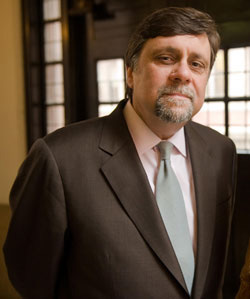In Opinion Piece, TC's Allegrante Defends Academic Freedom
Protect Academic Freedom in Iceland
By John P. Allegrante
The recent dismissal from Reykjavik University of Professor Einar Steingrimsson, a prominent mathematician who had been a leading member of the faculty in the School of Computer Science, raises grave questions about the wisdom of the university’s leadership and its future, as well as that of the broader question of academic freedom for the Icelandic community of scholars and scientists.
The university has said that Professor Steingrimsson was fired because of financial exigencies that have led to a reorganization of the internal academic programs at the university, including a decision to close a six-year-old School of Health and Education in whose faculty Steingrimsson also once held a portion of his appointment. However, Steingrimsson has consistently claimed that he was fired and subsequently physically barred from the Reykjavik University campus because he has been publicly critical of policies and decisions being made by university administrators, not the least of which has been the failure of university leaders to consult the faculty on academic matters. He also has accused university administrators of having largely ignored several recommendations by an advisory board of international scholars that would strengthen Reykjavik University as an international research university.
In the absence of an appointment and tenure system similar to that found in other universities and that assures independent academic inquiry and protects the speech of scholars and scientists, Reykjavik University operates more like a corporation than a university. In this context, the university’s decision to fire Steingrimsson might seem to be merely a contract dispute rather than what it in fact is: a far more serious violation of a fundamental value of the modern research university—the essential freedom of scholars and scientists to speak without fear of retribution for speech that is perceived to be offensive, critical, or inconvenient. Understood in that light, the decision by Reykjavik University can only send a chill down the spine of the academic and scientific community.
Steingrimsson is a productive scholar and highly-cited specialist in the field of algebraic combinatorics, the study of combinatorial theory and its applications in mathematics. He currently holds an Excellence Grant—his second successive award while at the university—from the Icelandic Research Fund, one of the largest research grants to have been awarded to Reykjavik University. And he heads up an equally productive group of postdoctoral fellows and junior colleagues whose work has put Reykjavik University in the global vanguard of study in combinatorics.
Some students and colleagues say Steingrimsson can be very difficult, even vocally obstreperous, but most say he is a brilliant mathematician and devoted teacher. Surely in a fledgling private university in a small country that now seeks to focus strategically on science, engineering, and technology, and aspires to be counted among the ranks of the world’s greatest universities, retaining any prominent mathematician among the faculty ranks would be a high priority.
Scholars, by their nature and profession, are critical and contrarian; most good university administrative leaders understand this and know that they must tolerate speech that they and other colleagues may sometimes find offensive or even odious. But, no university, nor its leadership, should violate the fundamental value that is held sacrosanct by every successful university—the ability of its faculty to speak freely about their ideas without threat of loss of employment for espousing unpopular ideas or ideals in their search for truth and in the creation of new knowledge. This includes protecting any speech that administrators simply don't like, perceive as nettlesome, or that makes them feel uncomfortable.
The Icelandic academic community and the Ministry of Education and Culture cannot look the other way in this case, nor can they ignore the opinion of the international community of scholars in mathematics, over 50 of whom have signed a communiqué expressing dismay at the university’s decision. A special, independent commission should be convened to investigate the circumstances of Professor Steingrimsson’s firing and should issue a finding with respect to the question of whether his rights under Iceland’s Declaration on the Premises and Freedom of Universities have been violated. The declaration was signed by the rectors of all Icelandic universities on June 15, 2005, and a crucial clause reads: “Academic freedom in the university community includes the right of academic employees to criticize the policies and actions of their respective institutions.” Reykjavik University’s treatment of Steingrimsson is also likely to be at odds with the provisions of the European Commission’s European Charter for Researchers.
If the broader Icelandic academic community does not seek to adjudicate what has happened to Einar Steingrimsson, then no scholar in Iceland will feel that he or she can speak without the threat of dismissal for teaching unpopular ideas or challenging university administrators’ policies and practices.
Skepticism, critical analysis, and the peer oversight that come with an appointment and tenure system that protects speech and assures free academic inquiry have made the great universities of Australia, Europe, the United Kingdom, and North America the envy of the world. Without these principles, scholars and scientists would not be able to question dogma that can lead to the creation of new knowledge that, in turn, can advance science and benefit society.
The Icelandic academic community and the Icelandic people deserve the same from their universities and nothing less.
# # #
John P. Allegrante is professor and deputy provost at Teachers College, the graduate and professional school of education at Columbia University. He has taught at and is a member of the International Advisory Board of Reykjavik University, where he was acting dean of the School of Health and Education in autumn of 2007.
Published Friday, Aug. 20, 2010
